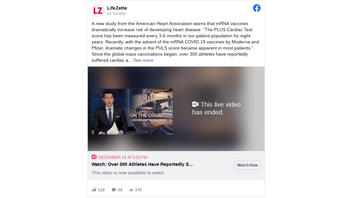
Does a new "study" from the American Heart Association (AHA) warn that COVID-19 vaccines "dramatically increase" the risk of heart disease? No, that's not true: The claim is based on an abstract, not a study, and it does not represent the position of the AHA, which recommends that people get vaccinated against COVID. The abstract, which was published in the AHA's journal Circulation, has since been corrected.
The abstract was cited in a Facebook post (archived here) on December 19, 2021. The post opens:
A new study from the American Heart Association warns that mRNA vaccines dramatically increase risk of developing heart disease.
This is what the post looked like on Facebook at the time of writing:
(Source: Facebook screenshot taken on Tue Dec 21 21:55:11 2021 UTC)
The post was referencing this abstract, originally published in Circulation on November 8, 2021. The post did not mention that the journal has since published an "expression of concern," as well as a correction.
To be fair to the person behind the post, the correction was published on December 21, 2021, two days after the Facebook post. The expression of concern, however, was published on November 24, 2021, well before the post. The expression of concern read, in part:
Soon after publication of the above abstract in Circulation, it was brought to the American Heart Association Committee on Scientific Sessions Program's attention that there are potential errors in the abstract. Specifically, there are several typographical errors, there is no data in the abstract regarding myocardial T-cell infiltration, there are no statistical analyses for significance provided, and the author is not clear that only anecdotal data was used. We are publishing this Expression of Concern until a suitable correction is published to indicate that the abstract in its current version may not be reliable.
The ensuing correction changed the title of the abstract to "Observational Findings of PULS Cardiac Test Findings for Inflammatory Markers in Patients Receiving mRNA Vaccines," from "Mrna COVID Vaccines Dramatically Increase Endothelial Inflammatory Markers and ACS Risk as Measured by the PULS Cardiac Test: a Warning." It fixed a number of typographical errors and changed the last sentence of the abstract to read:
In conclusion, the mRNA vacs numerically increase (but not statistically tested) the markers IL-16, Fas, and HGF, all markers previously described by others for denoting inflammation on the endothelium and T cell infiltration of cardiac muscle, in a consecutive series of a single clinic patient population receiving mRNA vaccines without a control group.
Previously, the sentence read:
We conclude that the mRNA vacs dramatically increase inflammation on the endothelium and T cell infiltration of cardiac muscle and may account for the observations of increased thrombosis, cardiomyopathy, and other vascular events following vaccination.
Lead Stories reached out to the author of the abstract, Steven Gundry, to ask about his research. We will update this story, as appropriate, if we hear back.
We also reached out to the AHA to ask about the abstract. In an email, dated December 21, 2021, a spokeswoman wrote:
The standard of practice for developing abstract programming for any scientific meeting is one intended to prompt scientific discourse, not to evaluate scientific validity. The submitting researcher(s) must always attest to the validity of the abstract. Abstracts are then curated by independent review panels - blinded to the identities of the abstract authors - and are considered based on the potential to add to the diversity of scientific issues and views discussed at the meeting. The Association never makes any representation or guarantees as to the accuracy or reliability of abstracts. Statements and conclusions are always solely those of the study authors and do not necessarily reflect the Association's institutional policy or position.
She continued:
The Association regrets any confusion regarding the Association's position on COVID-19 vaccines, especially among the lay public who may be unfamiliar with scientific meetings. The American Heart Association itself has been unequivocal in its belief in and support of vaccination as the best available public health strategy to address the pandemic.
The COVID vaccines approved for use in the United States are not known to increase the risk of heart disease. But, like all vaccines, COVID vaccines are not without risk.
The Centers for Disease Control and Prevention (CDC) is monitoring reports of myocarditis (inflammation of the heart muscle) and pericarditis (inflammation of the outer lining of the heart). Both have been reported as a rare adverse effect of authorized mRNA COVID-19 vaccines, particularly in adolescent boys. Nevertheless, the CDC continues to recommend that people get vaccinated, as the known benefits far outweigh any potential risks.


















